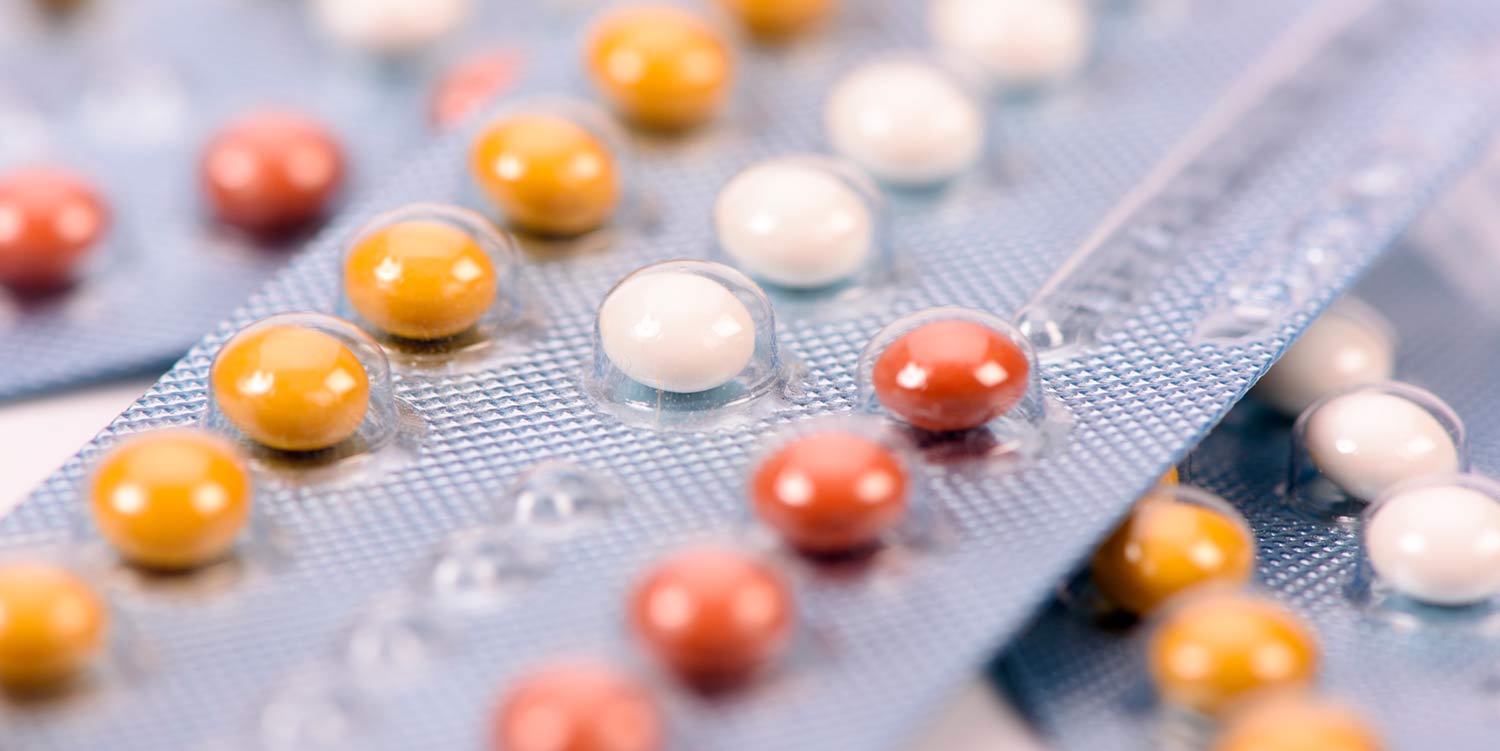Whether you are taking birth control pills to fight acne or to prevent pregnancy, going off the pills can lead to worse acne. This is especially true if you have been taking birth control pills for a long time.
Various scientific studies suggest that stopping birth control can lead to acne, inflamed skin, increased oiliness, and other skin problems. This is what we refer to as ‘post-birth control acne’.
Most women have taken birth control at some point in their lives. Whether they choose to stop in order to conceive a child or simply to avoid pills, of course they can only hope for a smooth transition.
How will my body and acne react once I stop taking additional hormones?
How will stopping birth control affect my acne?
How do I treat post-birth control acne?
These are some common questions women worry about before quitting hormonal contraception. Unfortunately, many are unaware of the acne risk after discontinuing birth control. In this article, we’ll answer all your questions and the most up-to-date information on post-birth control acne.
What is Post-Birth Control Syndrome (PBCS)?
Post-Birth Control Syndrome (PBCS) is defined by undesirable symptoms of acne, migraines, and irregular menstrual periods that arise within the first 4-6 months after discontinuing hormonal birth control.
Even though it is not recognized as a real medical condition in traditional medicine, a web search on PBCS will yield thousands of results.
Health practitioners claim that the use of hormonal contraceptives disrupts the body’s natural hormone balance or masks preexisting hormonal imbalance. In both cases, the result of stopping birth control is hormonal imbalance, which leads to PBCS.
According to a 2011 study, menstrual changes can persist for at least 2 cycles (and roughly up to 6 cycles) after quitting the pills. Symptoms include changes in menstruation length, onset, duration, intensity, and even the quality of your cervical mucus. Some studies claim that going off the pills can cause menstruation issues for as long as 9 months.
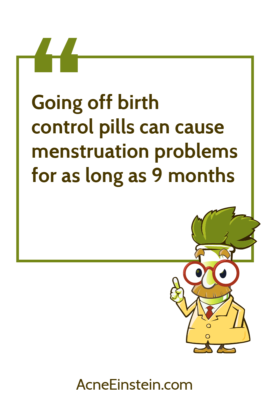
Another concern is a condition called post-pill amenorrhea, which is the absence of menstrual cycles after stopping the pill. However, studies suggest that this symptom alone is reversible and generally does not pose a major health threat.
In addition to their effects on monthly periods, birth control pills have also been claimed to negatively impact bone health. A study shows that this is true for both use and discontinuation of oral contraceptives. Yet another study found a lower risk of bone deterioration with the use of certain birth control methods, namely the progesterone-only shot norethisterone enanthate (NET-EN) and combination pills.
Scientists have not yet pinpointed the exact causes of these problems. It is believed that PBCS symptoms arise as the body tries to restore its normal hormonal levels and functions.
Even though the National Health Service, UK (NHS) states that most women will resume their normal periods within 2 to 4 weeks, some women have been shown to experience hormonal disruptions for significantly longer periods of time. On the flip side, some women may not experience any symptoms after discontinuing birth control.
That being said, it’s hard for us to predict exactly how your body and acne will react after you stop taking birth control. What we currently do know is that stopping birth control can cause a number of symptoms including:
- Irregular menstrual cycles
- Heavy and painful periods
- Weight changes
- Acne
- Excessive facial or body hair growth
- Decreased libido (sex drive)
How Will Stopping Birth Control Affect Your acne?
Changes in hormone levels play a central role in post-birth control acne. When you take the pills or use any other hormonal contraception, the continuous supply of hormones prevents your body from developing acne.
This is because the hormones from birth control pills can help control the male hormones, a major player in acne development. A study from the Oulu University Hospital (Finland) found that using patches and vaginal rings can also significantly reduce levels of hormones that trigger acne production.
Therefore, when you stop the birth control, the hormones gradually get back to their pre-birth control levels and contribute to acne resurgence.
Interestingly enough, many other factors can contribute to acne. Such examples include oxidative stress and decreased insulin sensitivity. Increased oxidative stress causes inflammation and creates an environment suitable for acne-causing bacteria P.acnes.
Likewise, high insulin levels trigger cellular changes in the skin that increase sebum and pimple production. High insulin levels, or decreased insulin sensitivity, can lead to an imbalance of cholesterol and fats. For this reason, patients with acne are more likely to have unhealthy fat levels in the bloodstream.
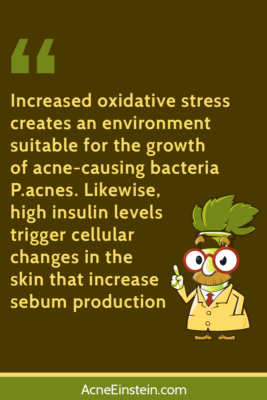
After coming off the pill, you might experience acne resurge due to one or more of the following reasons:
- Hormonal imbalance
- Increased oxidative stress (increased oxidation, decreased antioxidation, or vitamin/mineral imbalance)
- Chronic inflammation
- Decreased insulin sensitivity
There is limited information on how birth control discontinuation affects different types of acne. Birth control is used for treating both hormonal and cystic acne, so it is likely that the risk of both acne types increases when you stop birth control.
Factors that Affect Post-Birth Control Acne Risk
Post-birth control acne may largely depend on your pre-birth control hormone levels, genetics, type of birth control used, and lifestyle factors such as smoking.
The following factors play key roles in the acne risk of different birth control methods:
- Amount of estrogen and estrogen:progestin ratio. In general, higher doses of estrogen (ethinyl estradiol) yield higher risk of insulin insensitivity and thus acne.
- Type of progestin. Higher androgen effects (androgenicity) of the given progestin yields higher risk of post-birth control acne.
Numerous studies also suggest that:
- Combination pills containing newer progestins (i.e. desogestrel, gestodene, norgestimate) are less likely to cause acne than those with older-generation progestins (i.e. levonorgestrel, norethindrone)
- Progestin-only methods such as the Depo-shot (depot medroxyprogesterone acetate) are more likely to cause post-birth control acne
- Vaginal rings are less likely to cause post-birth control acne than pills
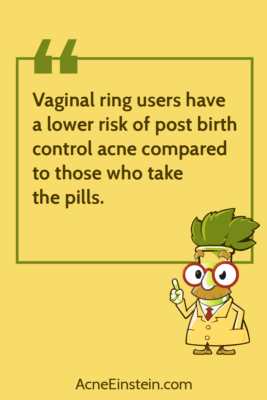
How to Treat Post-Birth Control Acne?
Time might be the most important factor in treating post-birth control acne, as your body will take anywhere from weeks to months before returning to its natural hormone levels.
In the meantime you can help your acne heal by limiting your intake of high-sugar foods, avoiding dairy products, and using zinc and antioxidant supplements.
Limiting your intake of high-sugar foods
A typical Western diet is loaded with carbs that can spike blood glucose levels and reduce insulin sensitivity. Therefore, if you are looking for a way to heal your acne, opt for low-glycemic-index foods that are low in carbs.
Studies show that a low-carb and high-estrogen diet reduces both insulin resistance and levels of sex hormones that can cause acne. Such foods can include green veggies, fruits, raw carrots, kidney beans, chickpeas, lentils, and bran breakfast cereals. These foods can not only reduce the risk of post-birth control acne but also help you lose weight as an added bonus.
Avoiding Dairy Products
There is a well-established link between dairy consumption and acne. Dairy products might increase the risk of post-birth control acne by triggering an inflammatory response and increasing the levels of hormones like IGF-1 and insulin.
The hormones in milk might also trigger acne, though this has not been proven yet. Read this page for more on dairy products and acne.
Using supplements
Taking a zinc supplement can help reduce inflammation and oxidative stress and thus improve post-birth control acne. You may take zinc by mouth or apply an ointment on your acne.
Because zinc contains many favorable properties for fighting acne, it can be a valuable addition to your skin regimen. One large study found that oral zinc supplementation was effective in treating inflammatory acne. However, as with any other supplement, the results may vary from individual to individual.
Another supplement you should consider for treating post-birth control acne is an antioxidant, or a combination of antioxidants. Oral intake of antioxidants like vitamins C, vitamin E, carotenoids, and chromium can improve acne. Likewise, topical application of vitamins C and E can reduce the risk of developing acne by protecting your skin from harmful UV rays.
A study suggested that vitamin C and E supplements can even offset the oxidative stress caused by oral contraceptives. Another study in 2014 suggested that vitamin B5 supplementation can help reduce acne lesions.
Using a combination of antioxidants might be better than taking individual antioxidants. According to one study, a combination of both water-soluble antioxidants (i.e. catechins found in green tea) and fat-soluble antioxidants (i.e. lipoic acid, beta-carotene, coenzyme Q10) probably offers the most complete protection against oxidative damage caused by oral contraceptives.
Click here to read more about the role of antioxidants in acne treatment.
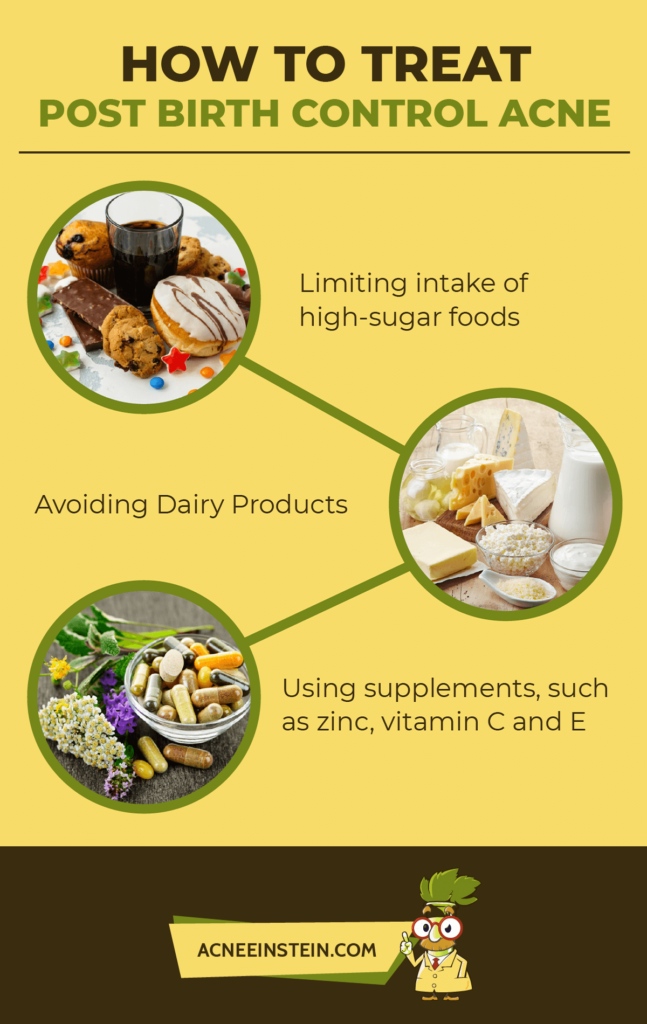
Frequently Asked Questions
How to avoid acne after going off birth control?
To minimize the risk of getting post-birth control acne you should:
- Use birth control with 3rd-generation progestins (see above)
- Avoid mini-pills and Depo-shots
- Use the minimum effective doses
- Go for methods other than pills, when possible
Does everybody get acne after stopping birth control?
No. The risk of acne after stopping birth control depends on your pre-birth control hormonal profile, genetics, and type of contraception used (method and doses).
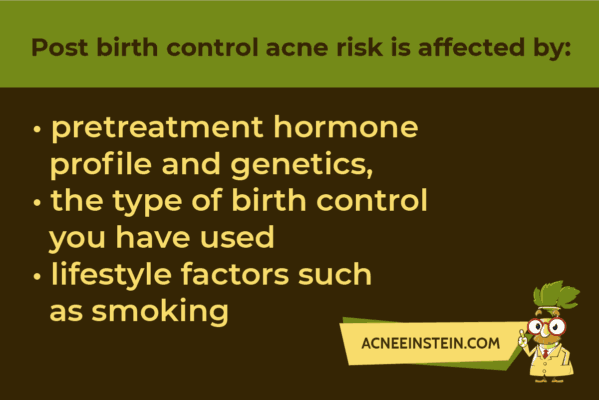
What about hormonal acne caused by birth control, will it go away after going off the pill?
Women who have suffered from acne caused by birth control say it takes up to a year for the skin to settle down after stopping birth control.
How long does it take to go back to normal after stopping birth control?
The NHS states that most women will resume their normal periods within 2 to 4 weeks after stopping birth control. Acne, however, can linger for almost a year.
Take away message
Acne after stopping birth control is common among millions of women who have taken hormonal contraceptives. Though not a serious medical condition, it can damage to your perceived self-image and confidence.
The good news is that there is evidence to support the following methods to lower your risk of post-birth control acne:
- Choose the right birth control pills. Aim for a pill with low-dose estrogen and new-generation progestins. Third-generation progestins have lower androgenic effects and minimal effect on insulin resistance, thus a more favorable acne profile.
- Opt for birth control methods other than pills, when possible. We recommend patches or vaginal rings.
- Take care of your overall health both during and after birth control use. This includes smoking cessation, protecting your skin from UV rays, taking antioxidant-rich and low-carbohydrate foods, and avoiding dairy products.
- And finally, give your body enough time to regain its natural hormone levels. Remember, it may take anywhere from weeks to months, or even a year for your body to adjust back to its pre-birth control condition.
What is your take on stopping hormonal birth control and acne? Leave a comment below and share your experiences!

